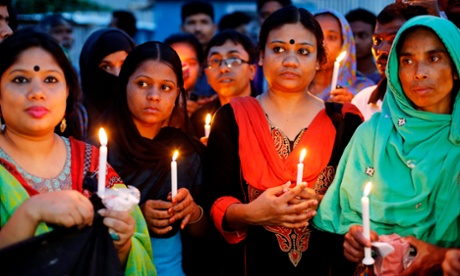
Two years since the Rana Plaza factory collapse in Bangladesh killed more than 1,100 people making clothes for western retailers, a fund set up to compensate victims remains $6m (£4m) out of pocket.
Campaigners around the world will mark the anniversary on Friday by calling for payments from companies including Walmart, Mango and Benetton that have so far contributed relatively small amounts to the compensation fund.
“Despite acquiescing to open and voluntary contributions at the brands’ insistence, we have had to spend the last year fighting for almost every donation made, and there still remains a notable gap in the fund,” said Ineke Zeldenrust of the Clean Clothes Campaign.
The shortfall, together with late payments, means around 3,000 people who worked at Rana Plaza or are family members of those who died are still waiting to receive 30% of the $30m workers’ rights groups say they are due in compensation.
In Bangladesh, unions are planning to mark the anniversary with demonstrations, including forming a human chain in the centre of Dhaka. They want local factory owners to pay into the fund.
Meanwhile, the UK-led Fashion Revolution campaign is encouraging people to contact their favourite fashion retailers through social media and ask: “Who made my clothes?” in an attempt to force retailers to be more honest about the conditions in often distant factories. Events in 69 countries will be supported by celebrities including models Lily Cole and Amber Valletta as well as Livia Firth, the ethical fashion campaigner.
Last week, Benetton finally paid $1.1m into the fund after more than 1 million people signed a petition on the campaigning site Avaaz. But campaigners said the Italian brand’s payment was not sufficient.
Jyrki Raina, general secretary of international union IndustriALL, said: “Two years after this industrial homicide, the victims of Rana Plaza are still waiting for full compensation. This is a collective responsibility, but we specifically call upon brands like Benetton, Mango, Walmart and Carrefour to contribute more.
“The global garment industry needs to show to its consumers that it has learned its lesson and is able to move on to addressing another burning question, the poverty wages paid to workers.”
Peter McAllister, director of the Ethical Trading Initiative, which is backed by British retailers including Marks & Spencer and Primark, encouraged brands that had sourced goods from the Rana Plaza complex to make payments. “It is unacceptable that nearly two years after the disaster, some victims and their families are still waiting for the compensation they are due,” he said.
A report from independent advocacy organisation Human Rights Watch released this week found that workers making clothes for western firms in Bangladesh continue to suffer from poor working conditions despite a wave of action in the wake of the 2013 collapse.
The report, based on interviews with 160 workers from 44 factories, detailed complaints of physical assault, verbal abuse, forced overtime, unsanitary conditions, denial of paid maternity leave, and failure to pay wages and bonuses on time or in full.
Three international coalitions set up in the wake of the incident at Rana Plaza have checked the structural integrity and fire safety of more than 1,900 factories in the past two years. A handful have been closed down and others made safe, but work to improve fire safety continues and is likely to take some time.
Sam Maher, of the workers’ rights campaign group Labour Behind the Label, said the work of the coalitions had undoubtedly improved safety and was pushing out the worst operators.
“In terms of safety, things have improved,” she said. “But the situation for trade unions is getting worse and conditions in the factories are not getting better. People are still suffering abuse, late payments or low wages.”
The Bangladeshi government had pledged to improve union representation as well as its factory inspection regime, as it tries to reassure international retailers about the safety of an industry highly important to its economy. Ready-made garments make up nearly four-fifths of Bangladesh’s exports and more than 10% of the developing south Asian nation’s GDP.
In the first year after the disaster union representation had doubled to 237 factories. But to date fewer than 300 of Bangladesh’s more than 3,500 clothing manufacturers have registered trade unions, and workers’ rights groups accuse the government of dragging its feet.
Ben Vanpeperstraete, a supply chain co-ordinator at IndustriALL, said: “We’ve seen important progress but the work ahead of us is huge. We have seen a significant increase in management violence towards unions in the last six months. We are saving lives but progress is held back because of the union situation.”

